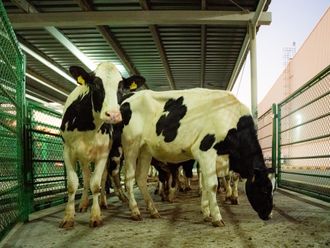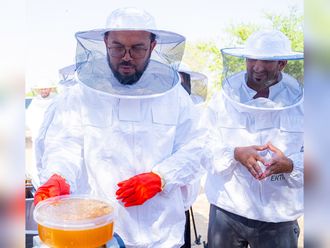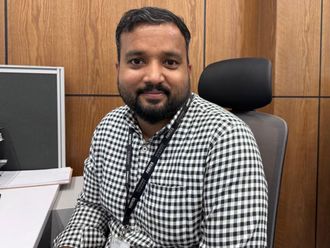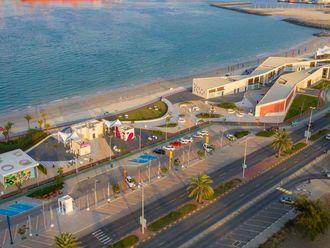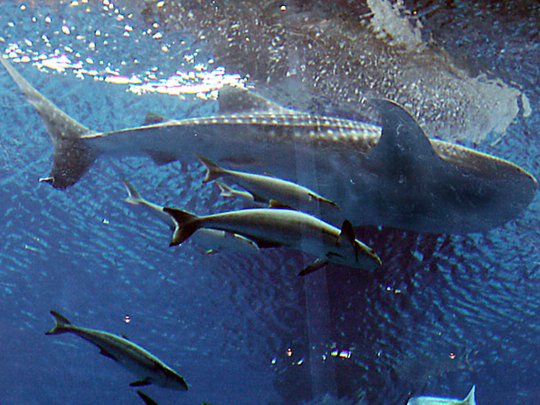
Dubai: Sammy's health and whereabouts will not be known for another three months, when its tracking device will pop up and transmit its location.
The female whale shark was tagged and quietly released on Thursday after it had been placed in a Dubai hotel aquarium for 18 months. The shark was said to have been rescued by the hotel's fish husbandry team in 2008.
No photos or invitations were sent to the media or the Dubai marine community to witness the much-anticipated release of the ocean's biggest fish. Sammy had caught the attention of thousands of people when Atlantis, The Palm, placed her in their aquarium, the Ambassador Lagoon.
In a statement by Atlantis, Steve Kaiser, vice-president, marine and science engineering, said the whale shark will be tracked through a tagging programme co-developed with the Mote Marine Laboratory in Florida.
"The whale shark is an animal about which little is known and Atlantis is proud that the research and data gathered can be shared amongst the marine community."
The device will not track the shark in real time, but instead will collect data on the animal's movements, depth, and water temperature for the next three months, and store the data inside the device.
Dubai-based underwater filmmaker, Jonathan Ali Khan told Gulf News he did not understood why the release of the whale shark had been carried out so secretly. Even the Arabia Whale Shark Research Programme was kept in the dark.
In December 2009, the Emirates Foundation announced it would give a grant of Dh850,000 for the production of a documentary film and research on whale sharks in the Gulf waters to Khan and his team. The documentary and research is expected to produce new theories on the species.
Sammy was apparently found in distress in shallow waters by fishermen and brought to the hotel for treatment in August 2008. She measured around four metres at the time. No information on Sammy during her captivity was released by the resort hotel. A spokesperson for the Ministry of Environment and Water said the Ministry did not order the whale shark's release but supports the action.
‘It's a waiting game at this point'
Dr Robert Hueter, director of the Centre for Shark Research Mote Marine Laboratory, which developed the tagging programme said although he was not present during the release, he had visited Atlantis in April 2007.
"It was under construction, and it was at that time the tagging programme was discussed with Atlantis staff and the satellite tags were set up for their use… I cannot comment on the health of the shark, other than to relay the Atlantis staff told me the animal was healthy, heavy, and had grown 0.6 metres in length in the one and a half years it was in the Atlantis aquarium. This growth rate is very similar to their rate of growth in the wild, indicating this shark was in good condition upon release."
The tracking device is called a "pop-up archival transmitting tag", or just satellite tag, manufactured by Wildlife Computers in the USA.
"If all goes as programmed, the tag will detach from the shark and "pop up" to the surface, where its stored data will be transmitted via satellite back to us in the lab in Florida. We will then be able to reconstruct the shark's movement track and the depths and water temperatures in which it swam," said Dr Hueter.
So far the centre has tagged about 30 whale sharks and other species in the Atlantic using the same technology, starting about six years ago. The success rate in recent years has run to about 90 per cent.
Nothing will be known about Sammy for the next three months, unless the tag comes off prematurely and starts transmitting. "In three months, if we hear nothing from the tag, it will not mean the shark is not moving or has died, because not all these tags successfully transmit their data," said Dr Hueter.
"Sometimes the tags are damaged and will not transmit, other times the tags get fouled with marine growth or are attacked by other fish, and so on. Sometimes the tags are late in transmitting but eventually we do get some data. So you see, it's a waiting game at this point."



